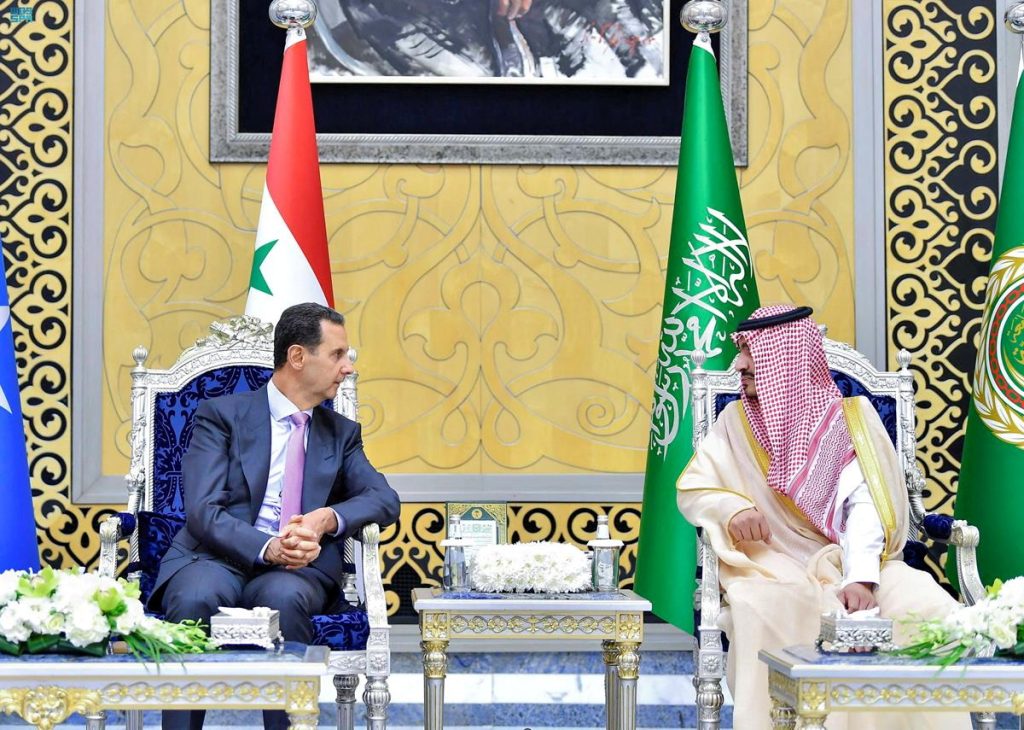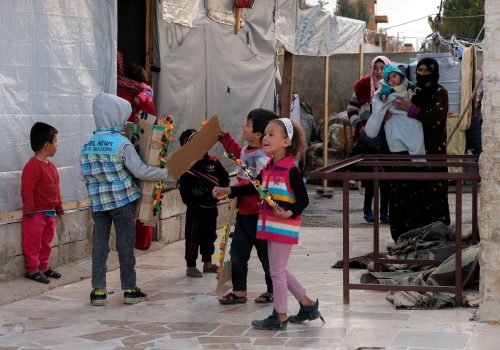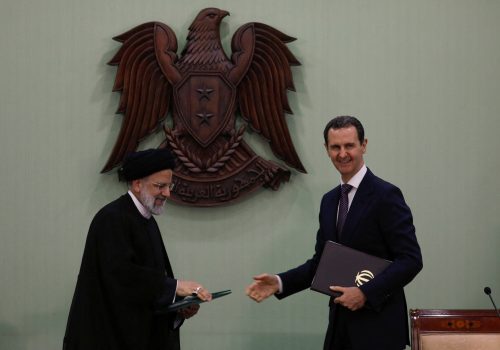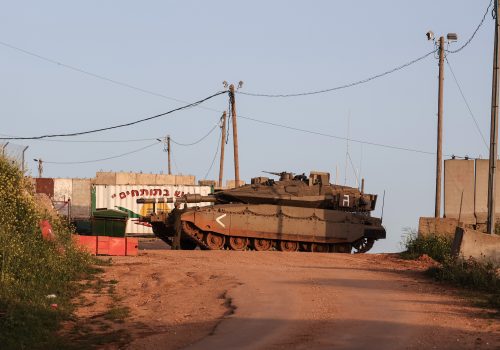As the Arab League began its thirty-second meeting on Friday in Jeddah, the summit’s agenda was as busy as ever. Center to the scene, however, was Syrian leader Bashar al-Assad’s return to Syria’s seat at the Arab League after being shunned for twelve years for turning his country’s 2011 revolution into the region’s most brutal war in decades.
Assad has done nothing to deserve this prize. His regime continues to displace half of the Syrian population, disappear hundreds of thousands, and pursue a military solution at the expense of anything and everything. Jeopardizing regional stability, Assad refuses to accept refugees back in the country, is flooding the Middle East and southern Europe with drugs, and continues to provide the largest operating base for Iranian militias in the region.
The Biden administration continues to publicly oppose normalization with Assad. At the same time, US Assistant Secretary of State for Near Eastern Affairs Barbara Leaf said recently that the administration is encouraging Arab countries to “get something for that engagement” with Assad. Discussions around the Arab League summit offer a glimpse into what Arab leaders appear to hope that “something” might be. Pre-summit conversations among regional actors, including Saudi Arabia, Jordan, Iraq, and Egypt, centered around three issues: the return of refugees, countering narcotics, and reestablishing state authority and institutions in Syria.
1. Refugee return
More than five million Syrian refugees live in countries bordering Syria, according to the United Nations Refugee Agency. For refugee-hosting countries in the region, a framework that allows for a systematic and sustainable return of refugees to Syria is a top priority to ease the economic conditions and labor-market challenges countries such as Jordan have faced for over a decade. The discussions in an earlier consultative meeting in Amman focused on strengthening Syria’s economy to incentivize refugees to return. In addition, Jordan demanded a clear timeline and specific measures to be implemented, including stabilization projects and general amnesties for refugees.
The hopes of returning millions of refugees back to Syria, however, are unlikely to materialize. In Bosnia, one of the few more optimistic historical examples, only half of those displaced returned to their original homes after the 1995 Dayton Peace Agreement. While refugee conditions in the region are often cruel and dangerous, the alternatives in Syria are not more enticing politically or economically.
2. Countering narcotics
Over the past decade, Syria has turned to the manufacture and export of the amphetamine captagon to raise money. The proliferation of the drug and the dangerous networks that export and distribute it make it an important issue for neighboring countries. Jordan, for example, is concerned that narcotics smuggling networks could facilitate weapons smuggling into the country. However, Assad seems less convinced to give up on the captagon production and smuggling operations, which have generated at least $57 billion in revenue for his regime. Diplomats who attended a consultative meeting ahead of Friday’s meeting in Jeddah privately disclosed to the author how Syria’s foreign minister left the discussions on captagon several times to consult with Damascus, before refusing to commit to any resolution on the issue.
Captagon production and smuggling also seem to be less urgent for Riyadh. Saudi Arabia appears to consider it an issue of organized crime, rather than a political or security issue. Even with a rumored Saudi offer of four billion dollars for Syria to stop producing captagon, it is unlikely that Assad would give up a source of regime income that netted multiple times that number.
3. Reestablishing state authority
Another important issue among regional players is the status of armed opposition groups and the foreign military presence in northern Syria. The pre-summit statements from Jeddah and Amman indicate a shift in language by Arab leaders against the roles of the United States and Turkey in northern Syria—and in favor of Iran and Russia. Previous Arab statements on Syria talked of ending the presence of “foreign militias,” a term that was always previously directed at Iranian militias and Lebanese Hezbollah.
Now, however, Arab governments involved in bringing Syria back into the Arab League are talking about ending the presence of “armed groups” and illegitimate foreign armies. This is a clear shift against non-state actors in northern Syria—the Syrian National Army in the northwest and the Syrian Democratic Forces in the northeast—and against their Turkish and US military partners. This indirect call for US and Turkish forces to withdraw from Syria does not apparently apply to Iran and Russia. Arab League Assistant Secretary General Hossam Zaki confirmed recently that the Arab demand for Iran to withdraw from Syria was “put aside.”
What about the United States?
These are three big issues that Arab leaders are eager to discuss. But strong disagreements among Arab League members, evidenced by the different statements coming from the participants in the earlier consultative meetings in Jeddah and Amman, suggest that it will be hard for the Arab League to advance on these objectives, either during the meeting in Jeddah or for long after.
The United States is, of course, not a member of the Arab League, but it can still make its presence felt. More US leadership on Syria—and specifically on these three core issues—could help Arab countries “get something” for their engagement that will improve the living conditions of Syrians, while at the same time empowering Assad’s opponents’ model of governance. The United States should work on cementing a permanent national ceasefire agreement with Turkey, Russia, and Iran to ensure that no more military operations will be conducted by the Assad regime to take back areas outside of its control.
The relative stability and security and an increased support for reconstruction in areas of northern Syria out of Assad’s control may lead to a genuine voluntary and safe return by many refugee communities in the region. Meanwhile, the United States, working with its Arab partners, can push Assad and his opponents in the north and support an agreement—not to solve the conflict at this point, but to reestablish the authority of vital state institutions in northern Syria. Reestablishing state-backed civic documentation and education in northern Syria would increase stability in the north while reducing national security threats for the United States and the region.
Without US leadership, the only outcome the Arab process will likely produce is the rehabilitation of Assad and his model of governance over the last decade.
Qutaiba Idlbi is a nonresident senior fellow with the Atlantic Council’s Rafik Hariri Center and Middle East Programs where he leads the Syria portfolio.
Further reading
Tue, May 16, 2023
Syrian refugees fear normalization with Assad. Because it means they will have to return—and not by choice.
MENASource By Arwa Damon
Syrian refugees fear that “normalization” of ties will boost the narrative that “Syria is safe now,” giving further justification to rid Syrian refugee populations.
Tue, May 16, 2023
The Arab League thinks readmitting Syria will push out Iran. They’re wrong.
IranSource By David Daoud
The logic of drawing Bashar al-Assad back into the Arab League is unsound, founded on the faulty premise that there remains such a thing as an independent Syrian regime to woo back from Tehran.
Thu, Apr 13, 2023
Hezbollah and its allies are more emboldened than they’ve been in nearly two decades
MENASource By Nicholas Blanford
The bottom line of this latest flare-up of violence along the Lebanon-Israel border is that Hezbollah, in coordination with Hamas, launched the largest barrage of rockets into Israel in nearly seventeen years without facing any repercussions.
Image: Syria's President Bashar al-Assad speaks as he attends the Arab League Summit in Jeddah, Saudi Arabia, May 18, 2023.



